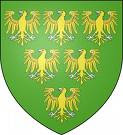2 weeks ago
Friday, 14 April 2017
Cardiff Castle
Cardiff Castle consists of 2 main buildings - an old, Norman Keep and a Victorian Gothic mansion, very much influenced by the history of the Norman keep. The original castle was a wooden motte and bailey castle, built by Robert Fitzhamon at the command of William the Conqueror. The castle's most famous prisoner was Robert of Normandy, the eldest son of William the Conqueror, who was held in custody by his nephew Robert the Consul. Robert the Consul built the current stone keep in 1135. Inside the Victorian building is a superb fire place telling the story of the 2 Roberts.
Robert the Consul is shown on his horse, whilst Robert of Normandy, or 'Robert Curthose' as he is known, is shown in his prison cell. As the eldest, it might have been expected that Robert Curthose would inherit the crown of England from his father. However, typical of the times, Robert had fallen foul of his father after a quarrel with his 2 younger brothers, William Rufus and Henry. He openly rebelled against his father, meeting him on the battlefield and even unseating him. There were attempts to reconcile, and when William I died, Robert was made Duke of Normandy, William Rufus the crown of England, and the youngest, Henry, was given money to buy lands. Both Robert and William eyed each other with suspicion, and made a pact to name each other as the other's heir. Robert was considered the more pliable of the brothers, and allowed himself to be drawn into plots and proved himself untrustworthy to all. Robert went to fight in the first crusade, and it was then that his brother William Rufus died - and younger brother Henry was there to seize the throne. Worse was to follow when Henry captured Robert after a decisive battle and seized Normandy from him. Robert was imprisoned in Cardiff castle for over 20 years, and died in 1134, when he was in his 80's. he was buried in the church of St. Peter in Gloucester - later re-named Gloucester Cathedral. His tomb is very striking, with the effigy dated to be put in place about 100 years after his death.
Of course he lies in the same cathedral as Edward II. Being buried in Gloucester Cathedral, I used to confuse him with the illegitimate son of Henry Ist, Robert of Gloucester, who later added to the Norman keep at Cardiff.
Subscribe to:
Comments (Atom)






